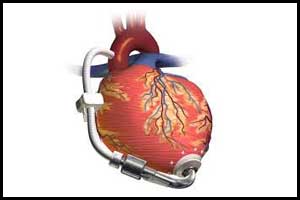- Home
- Editorial
- News
- Practice Guidelines
- Anesthesiology Guidelines
- Cancer Guidelines
- Cardiac Sciences Guidelines
- Critical Care Guidelines
- Dentistry Guidelines
- Dermatology Guidelines
- Diabetes and Endo Guidelines
- Diagnostics Guidelines
- ENT Guidelines
- Featured Practice Guidelines
- Gastroenterology Guidelines
- Geriatrics Guidelines
- Medicine Guidelines
- Nephrology Guidelines
- Neurosciences Guidelines
- Obs and Gynae Guidelines
- Ophthalmology Guidelines
- Orthopaedics Guidelines
- Paediatrics Guidelines
- Psychiatry Guidelines
- Pulmonology Guidelines
- Radiology Guidelines
- Surgery Guidelines
- Urology Guidelines
New cardiac pump device more cost effective than Standard Pump

An analysis of MOMENTUM 3 trial, which compared two cardiac pump devices: centrifugal HeartMate 3 (HM3) to the axial HeartMate II (HMII) continuous-flow Left Ventricular Assist System (LVAS), revealed that HM3 improved long-term outcomes and also decreased the cost of care over time for heart failure patients as compared to HMII LVAS.
The study was published in the journal Circulation and presented at the annual meeting of the Heart Failure Association of the European Society of Cardiology.
Mandeep Mehra, MD, executive director of the Center for Advanced Heart Disease, and colleagues conducted the study to evaluate health resource use and cost implications of the observed differences between the HM3 and HMII LVAS while patients were enrolled in the trial.
"The HeartMate 3 left-ventricular assist device (LVAD) is a more forgiving pump in terms of clinical adverse events, and now we can confirm that its increased effectiveness is associated with decreased costs," said Mehra. "In medicine, most often, a therapy that demonstrates increased effectiveness usually comes at a higher price, and we are able to show that this new technology actually decreases costs to payers and patients over time."
For the study, the researchers analyzed all hospitalizations and their associated costs, occurring after discharge from the implant hospitalization, until censoring (study withdrawal, heart transplantation, pump exchange with a non-study device or death). Each adjudicated episode of hospital-based care was used to calculate costs, estimated using trial data and payer administrative claims databases. Cost savings stratified by subgroups (study outcome (transplant, death or ongoing on device), the intended goal of therapy, type of insurance, or gender) were also assessed.
In 366 randomized patients, 361 comprised the as-treated group (189 the HM3 and 172 the HMII), of whom 337 (177 the HM3 and 160 the HMII) were successfully discharged following implantation.
Key Findings:
- The HM3 arm reduced costs due to re-hospitalization by 51 percent, largely driven by a decrease in stroke and pump malfunction requiring reoperation due to pump thrombosis
- Patients who received the HeartMate 3 experienced fewer hospitalizations and, on average, spent 8.3 fewer days in the hospital per year than those who received the HeartMate II.
The authors note that it may be possible to further reduce costs by decreasing outlier complications and reducing hospital length of stay and decrease early complications by improving patient selection criteria and considering this therapy before patients get too sick.
In April, Abbott Inc. issued a field safety notice regarding HeartMate 3 outflow graft twist complications with an incidence rate of 0.72 percent. The FDA issued a Class I recall but did not recommend the return of LVADs or avoidance of use in new patients.
Based on the study, the authors concluded that HM3 demonstrated a reduction in re-hospitalizations, hospital days spent during rehospitalizations, and a significant cost saving following discharge when compared with the HMII LVAS, irrespective of the intended goal of therapy.
For further information click on the link: https://doi.org/10.1161/CIRCULATIONAHA.118.035722

Disclaimer: This site is primarily intended for healthcare professionals. Any content/information on this website does not replace the advice of medical and/or health professionals and should not be construed as medical/diagnostic advice/endorsement or prescription. Use of this site is subject to our terms of use, privacy policy, advertisement policy. © 2020 Minerva Medical Treatment Pvt Ltd